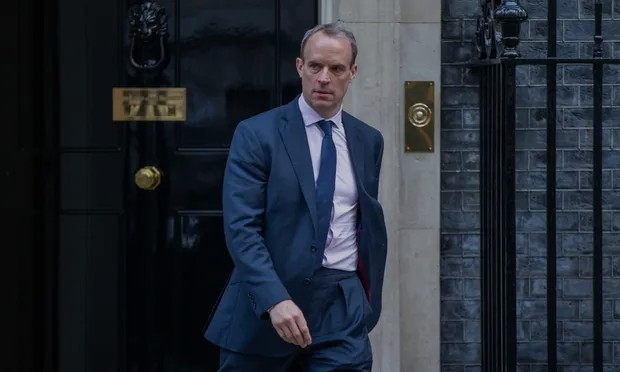Summary of story from The Guardian
Dominic Raab, the justice secretary, announced plans to “overhaul” the Human Rights Act, bring in a new British bill of rights and, as he put it, “restore common sense” to our laws. In reality, he is making real his long-held dream to weaken vital human rights protections, make justice conditional on good behaviour and insulate the state from accountability.
Raab’s plans make for grim reading.
They include:
- Stripping away the right to family and private life.
This is being done under the guise of the deportation of “foreign criminals”, a proposal that goes hand in hand with the government’s determination to use the revoking of citizenship as a punishment, creating instead a tiered system of rights protection based on your immigration status.
But human rights are universal – take them from one group and you take them from all of us. And of course the right to a private and family life goes a lot wider than immigration.
When the government hollows out these protections, we won’t be able to protect:
- Our private data
- Fight evictions
- Demand LGBT equality
- Resist mass surveillance.
Raab is also coming after so-called positive obligations.
These are the legal obligations on public bodies to protect rights.
- It was positive obligations that allowed the families of young soldiers at Deepcut barracks to expose the toxic culture that had led to their deaths.
- It was positive obligations that allowed survivors of the rapist John Worboys to challenge the Metropolitan police for their failure to bring him to justice.
- It was these obligations that enabled the Hillsborough families to expose police failings and corruption at a proper inquest.
Take away these obligations and you give licence to the police, the army and other state bodies to neglect their duties – with no possibility of justice.
Let us remember that it is these very state bodies that are responsible for some of the gravest human rights abuses that happen in the UK.
Raab also claims his reforms will “protect free speech”.
Free speech is a vital right that already receives special protection in the Human Rights Act. So it is clear that this government does not want to protect the principle of free speech – it wants instead to protect the kinds of speech it likes to hear and gag those it doesn’t. Just look at another bill going through parliament at the moment – the police, crime, sentencing and courts bill, which attempts to criminalise protest. There are also plans to take away whistleblower protections in the Official Secrets Act.
As it attempts this crude power grab:
- The Tory government is also attempting to put itself above the law by taking away the power of the courts to declare whether laws passed by parliament are compatible with human rights.
- It wants to tie the hands of judges by stopping them from giving remedies – payment of damages, for example – for human rights abuses if the remedy would be particularly onerous at the time for the public body.
- If that wasn’t worrying enough, human rights would be conditional on good behaviour, because judges will be required to take account of someone’s past conduct when deciding what remedy to award them.
- So the state could commit a hideous human rights violation but escape punishment by trawling through someone’s past to argue they do not deserve justice.
That is if their case even makes it to court.
Raab’s plans include a new “permissions stage” for all human rights cases, requiring people to show that they have faced “significant disadvantage” as a result of the abuse of their human rights before they can even argue their case. Evidence of this disadvantage would need to be shown before a trial, therefore needing you to get evidence of the said abuse from your opponent – the British state.
As a human rights lawyer, I have worked on many cases of terrible human rights abuses that became clear only when we cross-examined witnesses or managed to get disclosure of evidence.
There was a case about the death of a young woman in psychiatric care, in which the hospital said in witness statements that it had checked on her regularly as she had been assessed as being of high risk of suicide. When we managed to get the CCTV evidence on disclosure we found that this was a lie – she had been left completely alone in her room, and took her own life. Under Raab’s plans, these kinds of cases would never even see the light of day in court.

Comments
No comments yet. Be the first to react!